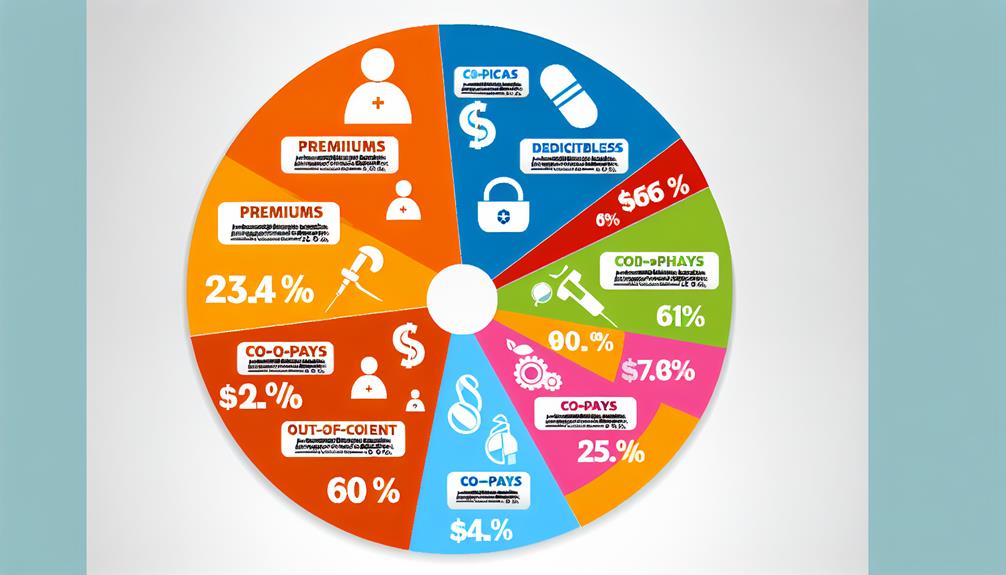Maneuvering through the maze of medical insurance can feel like trying to find your way out of a dense fog. When it comes to securing the right coverage as a senior, you need to know which providers stand out and why. Some companies, like Kaiser Permanente and UnitedHealthcare, offer unique advantages tailored to your needs. But how do you decide which plan truly fits your situation? Understanding the features and options available could make all the difference in your healthcare journey.
Key Takeaways
- Kaiser Permanente offers the lowest average costs and extensive network coverage, making it a top choice for seniors.
- UnitedHealthcare has a strong network of 1.3 million physicians and received high customer satisfaction ratings.
- AARP/UnitedHealthcare is recommended for Medigap plans, especially Plan G, providing comprehensive coverage options.
- Humana features low-cost Medicare Advantage plans with high customer satisfaction, averaging an additional $27 per month.
- Wellcare is recognized for its affordable Medicare Part D plans, often with low copays for prescription coverage.
Importance of Health Insurance
Understanding the importance of health insurance is vital for seniors, as it serves as a safeguard against high out-of-pocket medical costs. Many retirees rely on Medicare, which covers about 90% of seniors at age 65, providing extensive benefits like hospital coverage and outpatient care. This coverage is imperative because it directly impacts your access to essential services, helping you maintain your health and well-being.
Having adequate health insurance can greatly improve your health outcomes. With proper coverage, you gain access to preventive care and necessary prescription medications, allowing you to manage your health proactively. However, it's important to reflect on the financial implications. The average monthly cost for health insurance for a 60-year-old retiree is about $994. This highlights the financial importance of choosing the right plan to manage your healthcare expenses effectively.
Medicare Overview and Costs
Medicare is often a critical part of healthcare for seniors, providing fundamental coverage as you age. Understanding Medicare eligibility is imperative, as it begins at age 65, with automatic enrollment for those receiving Social Security disability benefits after 24 months. Medicare consists of several parts:
| Medicare Part | Coverage Type |
|---|---|
| Part A | Hospital insurance |
| Part B | Outpatient services |
| Part D | Prescription drug coverage |
Enrollment for Medicare starts three months before you turn 65, with special periods for qualifying circumstances. The average Medicare cost can vary, but you can expect to pay about $174.70 for Medicare Part B in 2024, while Medicare Advantage plans average around $27 per month. For couples aged 60, the average monthly cost for Medicare Advantage bundles drops to about $54.
Most enrollees won't incur costs for Medicare Part A, making it an attractive option as you move into Medicare at age 65. It's important to explore your options and guarantee you have the coverage you need for a healthy future.
Evaluation Methodology

Evaluating medical insurance providers for seniors requires a thorough approach that goes beyond just comparing plans. You'll want to analyze nearly 1,700 data points from various insurers to get a detailed view of their offerings. Key factors include average premiums, average silver deductibles, customer service, and quality of care.
The evaluation uses seven scoring categories, with 25% of the weight dedicated to average silver deductibles, which are essential for seniors who need ongoing care. The average premium carries a 15% weight, allowing insurers with lower unsubsidized premiums to score better. It's also important to take into account the variety of plan types—HMO, PPO, EPO, and POS—as higher scores are awarded to those offering more options tailored to seniors.
Customer service ratings from J.D. Power contribute another 15% to the overall score, reflecting the significance of customer satisfaction in senior care. By focusing on these metrics, you can make informed decisions about the best medical insurance providers for your needs, ensuring that you choose a plan that balances cost, care quality, and service.
Top Insurers for Seniors
When it comes to choosing the right medical insurance provider for seniors, several top contenders stand out regarding affordability, coverage options, and customer satisfaction. Here's a quick look at some of the best insurers you'll want to take into account:
| Insurer | Key Features |
|---|---|
| Kaiser Permanente | Lowest average costs, extensive network |
| UnitedHealthcare | 4.0 rating, 1.3 million physicians |
| AARP/UnitedHealthcare | Best for Medigap plans, especially Plan G |
| Humana | Low-cost Medicare Advantage, high satisfaction |
| Wellcare | Excellent Medicare Part D plans, low copays |
Kaiser Permanente leads the way with the lowest average costs for seniors. UnitedHealthcare, operating in 49 states, offers a vast network and solid ratings. AARP/UnitedHealthcare excels in Medigap plans, specifically Plan G, providing thorough coverage. Humana shines with its low-cost Medicare Advantage options and strong customer satisfaction. Finally, Wellcare stands out for affordable Medicare Part D plans, making it an excellent choice for those seeking low-cost options in senior health insurance.
Health Insurance Cost Breakdown

Choosing the right medical insurance provider is just the beginning; understanding the costs involved is equally important. For health insurance for retirees, the average monthly cost for a 60-year-old is around $994, while couples average $1,987. If you're looking for the lowest average monthly costs, consider Kaiser Permanente, which offers single coverage at about $910, compared to UnitedHealthcare's $963.
When it comes to Medicare Advantage plans, expect an additional average cost of about $27 per month. Keep in mind that Medicare Part B premiums for 2024 are set at $174.70 monthly, but most enrollees won't incur costs for Medicare Part A.
It's vital to recognize that cost variations exist based on the type of plan you choose. HMO plans typically offer lower costs than PPO plans, so it's wise to compare options. By evaluating these health insurance costs carefully, you can make informed decisions that best suit your financial situation and healthcare needs. Don't rush; take the time to understand what each plan offers and the expenses you'll face to guarantee you get the coverage you deserve.
Accessing Coverage in Texas
Accessing health insurance coverage in Texas can seem overwhelming, but it doesn't have to be. If you're 65 or older, you can enroll in Medicare. Enrollment starts three months before your birthday, and be sure to check for Special Enrollment Periods to avoid penalties. For those not yet eligible, the Health Insurance Marketplace offers various coverage options.
Here's a quick comparison of some key factors:
| Coverage Type | Details |
|---|---|
| Medicare | Available at 65, includes several parts (A, B, C, D) |
| Health Insurance Marketplace | Plans available for those under 65; premium tax credits can help reduce monthly costs |
| Average Monthly Cost | About $994 for a 60-year-old retiree in Texas |
| Popular Providers | Kaiser Permanente, UnitedHealthcare |
| Provider Networks | Extensive networks tailored for retirees |
Understanding your options is essential. Medicare provides a solid foundation, while the Marketplace can offer assistance for younger seniors. Don't forget about premium tax credits that can considerably lower costs. With the right information, accessing coverage in Texas can be a smoother process.
Choosing the Right Plan

Selecting the right medical insurance plan can greatly impact your health and finances as a senior. Start by considering providers like Kaiser Permanente and UnitedHealthcare, known for their extensive networks and tailored coverage options. When evaluating your choices, pay close attention to the costs of premiums and deductibles. For instance, Kaiser Permanente averages $910 for single coverage, while UnitedHealthcare comes in around $963, which can greatly affect your budget.
It's essential to look for plans that include fundamental health benefits, such as preventive services and prescription drug coverage, to maintain your health during retirement. These features guarantee you receive necessary care without exorbitant out-of-pocket expenses. Additionally, assess customer satisfaction ratings, as UnitedHealthcare has received high scores in the J.D. Power survey, reflecting their strong customer service.
Lastly, be mindful of enrollment periods. Choosing the right plan requires you to be aware of these timeframes to avoid penalties for late registration. By carefully considering these factors, you can select a medical insurance plan that aligns with both your health needs and financial situation, paving the way for a healthier, more secure retirement.
Key Features of Leading Providers
When it comes to finding the right medical insurance provider, understanding the key features of leading options can make a significant difference in your decision-making process. Kaiser Permanente stands out with a top rating of 5.0 from Forbes Advisor, offering low average costs for 60-year-olds and access to 39 hospitals and over 734 medical facilities. If you're looking for a wide provider network, UnitedHealthcare covers 49 states with 1.3 million physicians and 6,500 hospitals, plus telehealth services.
For those interested in Medicare Supplement plans, AARP/UnitedHealthcare is highly recommended, especially for Plan G, which provides extensive coverage with valuable add-on benefits. Wellcare is known for its affordable Medicare Part D plans, often available for under $1 a month, making it a great choice for prescription drug coverage. Finally, Humana offers low-cost Medicare Advantage options, averaging just $27/month while achieving strong customer satisfaction ratings.
These features can help you choose a provider that best meets your healthcare needs and budget, so consider them carefully as you navigate your options.
Supplemental Coverage Options

Supplemental coverage options, like Medicare Supplement (Medigap) plans, are vital for filling in the gaps left by Original Medicare. These plans help cover out-of-pocket costs that Medicare doesn't cover, such as copayments, coinsurance, and deductibles. AARP/UnitedHealthcare is widely recognized as the best provider for Medigap plans, especially Plan G, which offers extensive coverage for new enrollees.
Here's a quick comparison of Medigap plans:
| Plan Type | Coverage Highlights |
|---|---|
| Plan A | Basic hospital coverage |
| Plan G | Extensive coverage |
| Plan N | Lower premiums, some copays |
To enroll in a Medigap plan, you must be enrolled in Medicare Part A and Part B. You can apply during the six-month Medigap Open Enrollment Period, which starts when you turn 65 or enroll in Part B. Availability of specific plans varies by state, so it's important for seniors to compare options based on their health needs and budget. While Medigap plans often cost more than Medicare Advantage plans, they provide standardized coverage, ensuring similar benefits across different insurers.
Resources for Seniors
Finding the right medical insurance is just the beginning of guaranteeing you have the support you need as a senior. It's crucial to explore resources that can enhance your healthcare experience. For instance, Kaiser Permanente stands out as a top option, providing access to telehealth services across eight states, making healthcare convenient. If you're looking for extensive coverage, UnitedHealthcare offers a vast network with over 1.3 million physicians and 6,500 hospitals.
For those considering additional coverage, AARP/UnitedHealthcare provides highly regarded Medicare Supplement plans, like Plan G, which helps minimize out-of-pocket costs. Wellcare is another excellent choice, especially for prescription drug coverage, featuring low copays for generic medications and plans starting at under $1 per month.
If you prefer a more thorough plan, Humana offers various Medicare Advantage plans with competitive pricing, sometimes starting at $0/month. These options guarantee you're not only covered but also supported in managing your healthcare needs. By leveraging these resources, you can navigate your healthcare journey more confidently and effectively.
Frequently Asked Questions
Which Health Insurance Is the Best for Seniors?
So, you're wondering which health insurance is the best for seniors, huh? Well, let's just say picking the right plan is as thrilling as watching paint dry! But seriously, you need one that fits your needs. Look for plans with low costs, decent coverage, and good reviews. Companies like Kaiser Permanente and AARP/UnitedHealthcare often come highly recommended, so check them out. You deserve the best, even if the process feels like a maze!
What Type of Medical Insurance Do Most Retirees Have?
Most retirees rely on Medicare as their primary medical insurance. When you turn 65, you'll likely be eligible for its various parts: Part A covers hospital stays, Part B covers doctor visits, Part C offers Medicare Advantage plans, and Part D takes care of prescription drugs. Many also consider Medigap policies to help with out-of-pocket costs. If you're under 65, you might explore ACA marketplace plans for more affordable options.
Who Has the Best Medicare Plan for Seniors?
Did you know that nearly 63 million Americans are enrolled in Medicare? When looking for the best Medicare plan for seniors, it really depends on your needs. Kaiser Permanente often tops the list for its overall value, while AARP/UnitedHealthcare shines with its Medigap Plan G. If you're after affordability, Humana's plans start at $0/month. Don't forget to compare the options based on coverage, costs, and customer satisfaction to find what suits you best!
What Is the Best Health Insurance Company to Go With?
When you're choosing a health insurance company, consider factors like coverage options, cost, and customer service. It's important to compare plans that meet your specific needs. Look for companies with strong ratings and positive reviews from other customers. You want a provider that offers extensive coverage while being affordable. Don't forget to check if they have a network of doctors you're comfortable with, as this can greatly affect your care experience.
